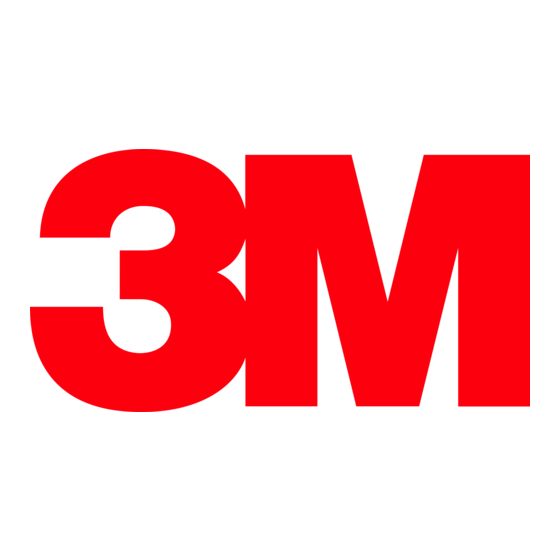3M 6000 Scheda tecnica - Pagina 3
Sfoglia online o scarica il pdf Scheda tecnica per Sistemi di filtrazione dell'acqua 3M 6000. 3M 6000 5. Half facepiece respirator
Anche per 3M 6000: Manuale d'uso (4 pagine), Istruzioni per l'utente (16 pagine), Foglio di istruzioni (2 pagine), Foglio di istruzioni (8 pagine), Istruzioni per l'utente (15 pagine), Istruzioni per l'utente (2 pagine)

Approvals
These respirators have been produced to comply with the requirements of
the Australian /New Zealand Standard AS/NZS 1716:2003 under an agreed
production certification scheme operated during manufacture in accordance
with the SAI Global StandardsMark programme.
The 3M 6000 Series Respirators and 6000/5000/2000 Series Filters have
been shown to meet the Basic Safety Requirements under Article 10 and
11 B of the European Community Directive 89/686/EEC, and are thus CE-
marked. These products were examined at the design stage by: BSI
Product Services, Kitemark House, Maylands Avenue, Hemel Hempsted,
Herts, HP2 4SQ, England (Notified Body 0086).
Standards
These products have been tested to the relevant Australian/New
Zealand and European Standards:
� 6000 Series Half Face Respirators to AS/NZS 1716:2003,
EN140: 1998.
� 6000 Series Gas and Vapour filters to AS/NZS 1716:2003,
EN14387:2004 + A1:2008
� 2000 and 5000 Series and 6035, 6038 Particulate filters to AS/
NZS 1716:2003, EN143: 2000 / A1:2006.
Correct Usage
When the 6000 Series Half Face Respirator is fitted with Gas &
Vapour Filters:
� 6000 Series gas and vapour filters, it may be used in
concentrations of gases or vapours (types specified by 3M) up
to 10x the Exposure Standard (ES) or 1000ppm whichever
value is lower.
� 6075 offers protection against organic vapour (as above) and a
maximum of 10ppm formaldehyde only.
� 6000 Series gas and vapour filters should not be used to
protect the wearer against a gas or vapour that has poor
warning properties (smell or taste).
When the 6000 Series Half Face Respirator is fitted with
Particulate Filters:
� 2000, 5000 or 6000 series particulate filters may be used in
concentrations of particulates up to 10x ES
� 2128 and 2138 filters offer protection against organic
compounds with low vapour pressures (<1.3Pa @ 25 degrees
Celsius) in concentrations up to 10x ES.
� 2128 and 2138 filters may be used to protect against ozone up
to 10x ES and offer relief from acid gases and organic vapours
at levels below the ES.
� 6038 offers protection against a maximum of 30ppm Hydrogen
Fluoride and offers relief from ozone, acid gases and organic
vapours at levels below the ES.
Cleaning and Storage
Cleaning is recommended after each use.
1. Disassemble by removing the filters, head straps and other
parts.
2. Clean and sanitize the respirator (excluding filters) using 3M™
Respirator Cleaning Wipes 504 or immersing in warm cleaning
solution and scrubbing with a soft brush until clean. Parts may
also be cleaned in a domestic washer.
3. Disinfect respirator by soaking in a solution of quaternary
ammonium disinfectant or sodium hypochlorite (30 mL
household bleach in 7.5L of water) or other disinfectant.
4. Rinse in fresh, warm water and air-dry in noncontaminated
atmospheres.
G Water temperature should not exceed 50°C.
G Do not use cleaning agents that contain lanolin or other
oils.
G Do not autoclave.
Use Limitations
1. These respirators do not supply oxygen. Do not use in oxygen
deficient areas*
2. Do not use for respiratory protection against atmospheric
contaminants, which have poor warning properties, are
unknown or immediately dangerous to life and health, or
against chemicals, which generate high heats of reaction with
chemical filters. (The 3M SA-2000 Supplied-Air Respirator
System can be used against contaminants with poor warning
properties, subject to other use limitations).
3. Do not modify or alter this device.
4. The assembled respirator may not provide a satisfactory face
seal with certain physical characteristics (such as beards or
large side burns) resulting in leakage between the respirator
and the face. The user assumes all risks of bodily injury, which
may possibly result.
5. Do not use with unknown concentrations of contaminants.
6. Do not use for escape purposes.
7. Leave the work area immediately and check the integrity of the
respirator and replace respirator and / or filters if:
� Damage has occurred or is apparent.
� Breathing becomes difficult or increased breathing
resistance occurs.
� Dizziness or other distress occurs.
� You taste or smell the contaminant or an irritation occurs.
8. Store this device in a sealed container away from
contaminated areas when not in use.
9. Use strictly in accordance with respirator and filter user
instruction leaflet.
* 3M definition minimum 19.5% by volume oxygen
